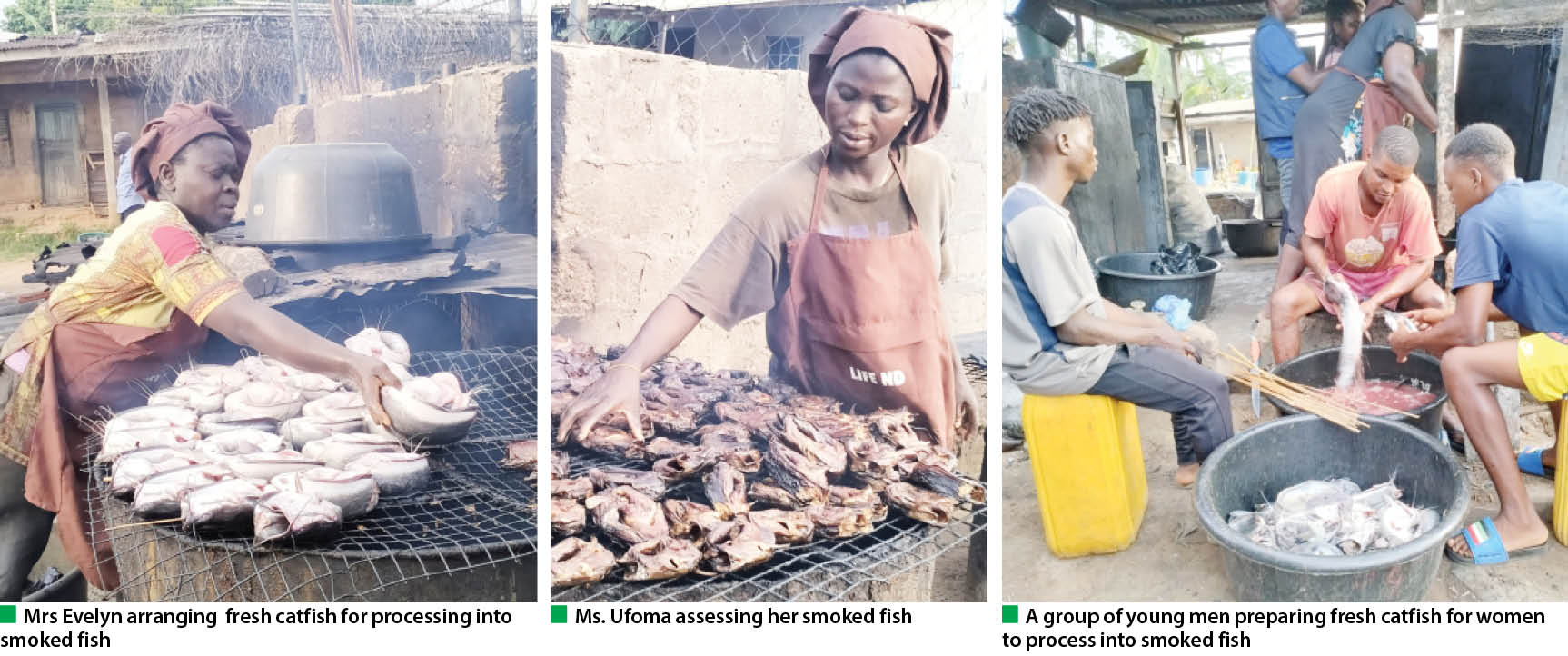How women, youths generate income through fish processing
You do not need to run a fish farm or sell fish in any form to generate money. There are other income-generating activities in the value chain that can put money in people’s pockets. A group of women in Uteh fish community Ikpoba-Ukha LGA in Edo State are making money by just smoking or drying […]

how women, youths generate income through fish processing
You do not need to run a fish farm or sell fish in any form to generate money. There are other income-generating activities in the value chain that can put money in people’s pockets.
A group of women in Uteh fish community Ikpoba-Ukha LGA in Edo State are making money by just smoking or drying the fish through smoking kin for major marketers and sellers for a charge.
A kilogram of fish is smoked by these women for N350, and several of them smoke 150 kg in three days. This corresponds to a daily average of N17,000.
How it’s done
A dry fish marketer goes to the community, and buys fresh fish from the farmers at the farm gate. He or she then negotiates with the women who will smoke it for the buyer.
- NIHORT to conduct research on watermelon diseases dislodging Bauchi farmers to Cameroon
- NIMET prediction: Bauchi farmers cautioned against planting on flood-prone areas
The fish could be smoked using a modern gas-powered smoking kiln or a traditional wood-fired method, depending on what the marketer desires. Whichever method the vendor prefers will also affect the price.
Marketers who have high-end clientele tend to favour dry fish because it allows them to connect with consumers outside of the state, such as in Lagos and Abuja.
These women are not only hired by marketers but also engaged by farmers who want to process their fish before selling it.
A thriving business for women
These women set up their facilities in addition to those provided at Sonny Fish for All Konsult, which also serve as an Incubation Centre for Livelihood Improvement Family Enterprises Project for the Niger Delta – a federal government project that promotes community-based on-farm and off-farm business activities along key agricultural value chain as a mechanism for job and wealth creation.
Mrs. Evelyn Ese has been in the business for about five years in the community as a processor. She neither owns a fish pond nor sells fish. Her job is to process for either the farmers or marketers and gets paid.
“I process between 100kg and 300kg depending on the sizes of the fishes and get paid between N15,000 and N17,000. The fish gets dried properly after about two to three days.
“This is a business that helps me to be relevant at home. Through it, I raise money to support my children and husband in meeting some basic needs of the family,” Evelyn said.
Ufoma Esen is another young woman who has found for herself a means of generating income. Although she has been in the business less than three years, it has been worthwhile as she makes a living through processing fish for marketers and farmers alike.
This business helps me a lot because I can support my parents. I am no longer idle because every day we are here processing fish. Sometimes, I do about 100kg, sometimes 80kg and sometimes more than that depending on how much I can handle.
Ufoma said as the farmers are expanding, so is the business. “Our business depends on the fish farms. If the farmers are expanding, our business will expand and our capacity to process more will also expand,” she said.
She is optimistic that the fish farming business will continue to expand, which will translate into a booming business for them.
Also speaking, Idemudia Ese describes the venture as financially rewarding for any hardworking woman.
“We have people from other fish farm clusters bringing fish here for processing. If you’re not lazy, one can at least make money enough to support the family,” Ese said.
Young men too
Daily Trust on Sunday also came across young boys who are in another aspect of the processing. Their job is to help these women prepare the fish to smoke. Their job ends at folding the fish in a round shape for the drying process.
These young men are in turn paid by the women who are contracted by either the marketers or the farmers to process their fish.
Experts have been harping on the development of value change activities, noting that the largest employment opportunities in the sector are in the value chain.
As the farms expand, other value chain activities like selling of feeds, transportation, among others, are likely to evolve.
